🎉
We've raised a $25M Series A. Read more
Top 10 Apollo Alternatives | Pricing, Features, Response Rates [2025]
![Top 10 Apollo Alternatives | Pricing, Features, Response Rates [2025]](/_next/image?url=https%3A%2F%2Fimages.ctfassets.net%2Fkyprwggh4muz%2FtThIzALNNJRnpvrieiRRn%2F35c233cd1d0dc246e45a000196ee1e86%2FArtboard_1.webp&w=3840&q=75)
Apollo has rocketed in popularity over the last few years. Ranked among the market leaders in numerous categories on G2, there’s no doubt it’s a powerful platform.
But it’s not without its drawbacks.
Whatever your reasons for searching for an alternative, whether it’s Apollo’s price, complex dashboard and steep learning curve, lead data accuracy, or limited AI functionality, we’ve got your back.
We’ve covered the top alternatives to Apollo, from enterprise-level market leaders like ZoomInfo to fresh-off-the-line, AI-first companies like Artisan.
And don’t worry, we’re not going to make it all about comparing the sizes of databases. We’re just going to make it a little bit about that.
Apollo Alternatives: Quick Comparison
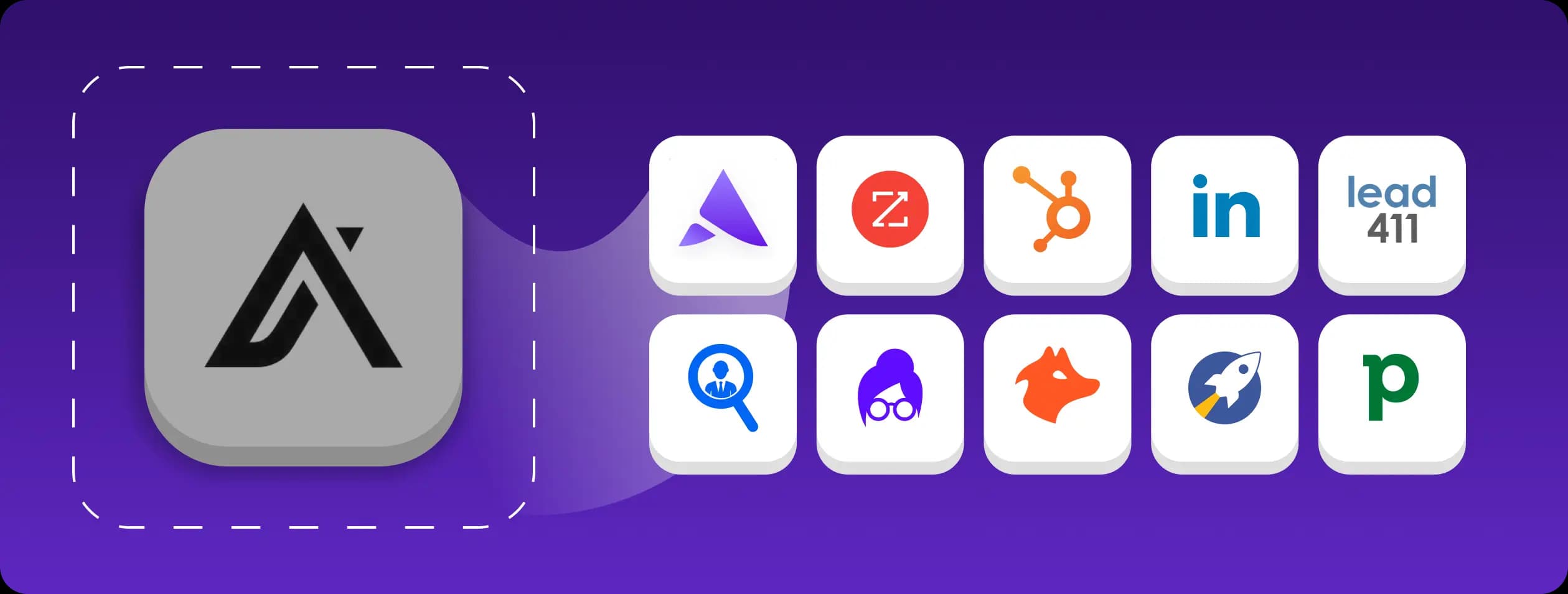
Here’s the ten-second breakdown of the top Apollo alternatives and what you can expect in terms of key features and pricing.
We recommend reading the full article for a thorough understanding of your options, but this table will give you a solid overview of the market.
Company | Key Features | Pros | Cons | Pricing (Monthly) |
Artisan | AI functionality Lead database (300M+) Workflow automation | Comprehensive platform Automation for all stages Built-in hallucination checks | Some missing features as early-stage startup Expensive for smaller companies | Custom |
ZoomInfo | Customizable enterprise tools Lead database Integrations library | Many enterprise features Easy-to-use interface Numerous integrations | Expensive Limited AI functionality Unresponsive customer service | Custom |
HubSpot Sales Hub | Sales engagement sequences Lead scoring CRM integration | Integrates with HubSpot CRM Meeting scheduler Easy-to-use platform | No lead database Limited AI functionality Per-user pricing can add up | $20 - $150 |
LinkedIn Sales Navigator | Lead database (60M+) Intent tracking Integrations library | Useful for manual LinkedIn outreach High-quality lead data Integrates with main CRMs | Small database Limited automation and AI functionality Most advanced features require custom plan | $99 - $169.99 |
Lusha | Lead database (50M+)
Workflow automation | Transparent pricing Emphasis on GDPR-compliant data Simple platform | Phone data requires credits Few segmentation features Lack of AI functionality | $49 - $79 |
Seamless AI | AI-enriched lead database Workflow automation Lead search engine | Strong AI functionality Automation tools Lead search engine | Credit-based structure Limited customer support Many advanced features only on higher-tier plans | ~$150 |
Hunter | Email search tool Campaign automation Integrations | Good email data accuracy Unlimited users Browser add-on | No phone data Restrictions on searches Limited automation and AI features | $49 - $499 |
Rocket- Reach | Leads database (700M+) Intent signals API | Large lead database Well-priced individual plans Email automation | Questionable database quality Requires annual plan for unlimited data Limited integrations | $39 - $349 |
Lead411 | Unlimited data access Intent signals Outreach management | Large database CRM integrations Chrome extension | Expensive Few integrations Intent data not on all plans | $99 |
Pipedrive | Outreach management Analytics Large library of integrations | Powerful platform Growing AI functionality Many integrations | No lead database Convoluted pricing Still early for AI functionality | $14 - $99 |
Now you know what’s on offer, let’s jump into detailed reviews of the leading Apollo alternatives and find the one that's the perfect fit for your business.
1. Artisan
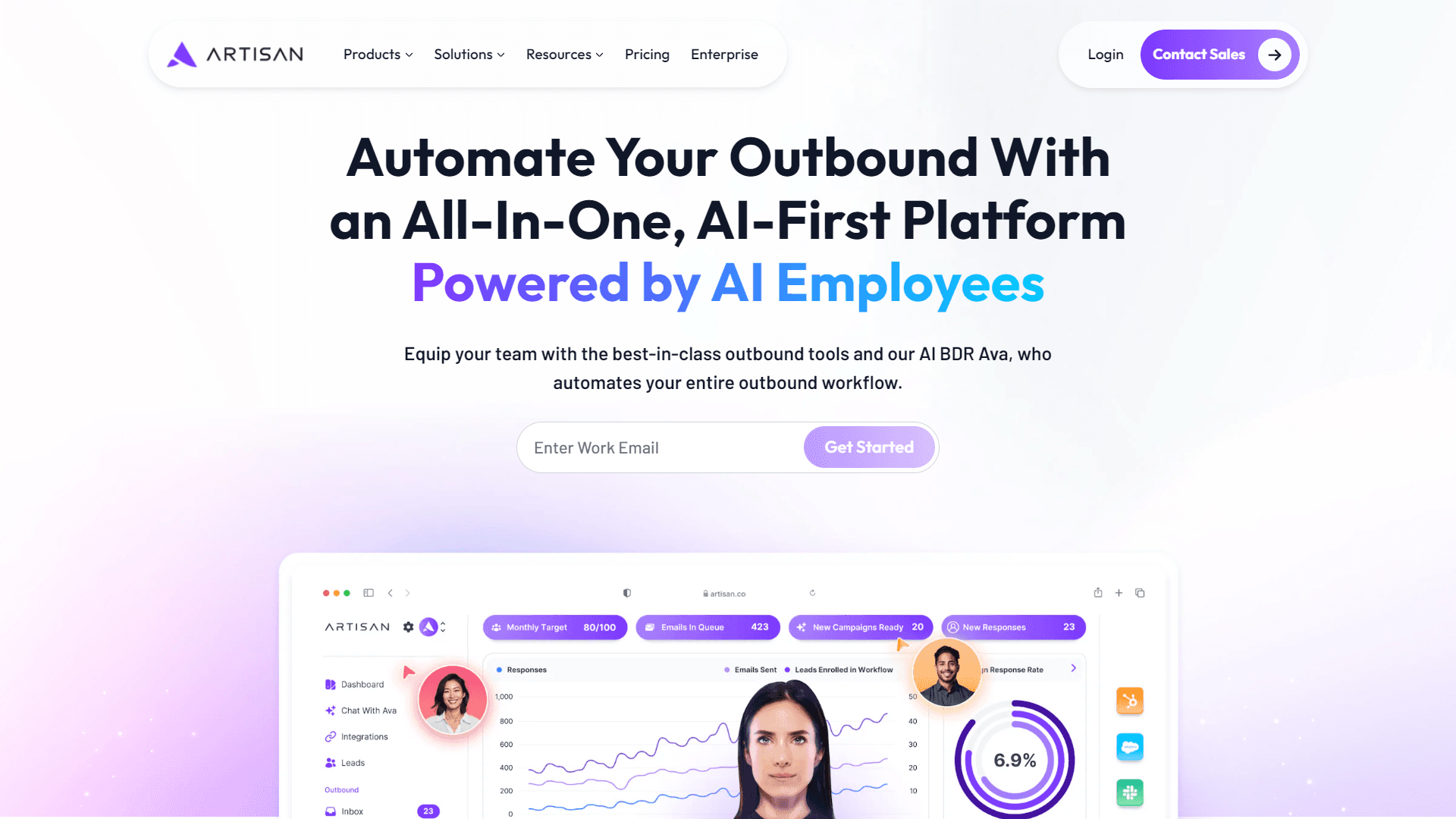
Artisan is an AI-first, all-in-one outbound sales automation and lead gen platform. Unlike the other entries on this list, AI is baked right into the core of the software in a very nuanced and wide-reaching way.
Artisan’s AI engine is a human-like “employee” called Ava. She’s a virtual business development representative (BDR) who can automate 80% of the outbound sales process and will get your first campaign up and running over the course of a 10-minute conversation.
Ava puts together your ideal customer profile, prospects the Artisan database of over 300 million contacts, filters and enriches the leads, and crafts and sends bespoke email sequences.
You can also, of course, access features manually where appropriate and have full control over what’s automated.

Key Features
Baked-in AI engine. Artisan’s AI sales development representative (SDR), Ava, streamlines and improves every part of the outbound sales process, from campaign setup to the actual outreach itself.
Lead database. Apollo’s database has over 300 million leads across 200 countries with up-to-date and fully enriched lead data.
Web scraping. Ava collects data points from a wide set of sources, including company websites and social media like LinkedIn and Twitter.
Workflow replication. Already have successful outbound sales workflows? Excellent. Ava can replicate and automate them in Artisan by building a dedicated playbook for your target outreach and email sequences.
Email automation. Artisan’s email outreach tools are fully automated, with timezone tracking, translation, bounce testing, and dynamic send limits baked in. Send follow-up emails, receive notifications about interested leads, and manage responses via the intuitive email dashboard.
Email warmup. Built-in email warmup service ensures that your mailboxes are prepped and ready to go without fear of penalties. No need to pay for a dedicated third-party warmup service.
Analytics. You’ll have access to comprehensive data about your campaigns with metrics like lead response rate, mailbox health, most successful campaigns, and more.

Pricing
Artisan pricing varies based on the lead volume and customization required. However, you’ll get one-on-one onboarding, and there’s no charge until your campaign is firing on all cylinders (so you’re not worrying about idle time).
For a pricing consultation and to learn how Ava can boost your sales enablement, reach out to Artisan’s sales team.
Pros
Uses active web scraping and AI enrichment to identify a wide range of lead data points including intent and technographic data
Comprehensive platform for all aspects of sales outreach
Automation for every stage of your outbound workflow
Automates email writing based on successful email playbooks and emulation of true human style
Built-in hallucination checks to prevent AI-related mistakes
At the forefront of AI to create hyper-personalized research, enrichment, and outreach workflows
Cons
As an early-stage startup, some features are missing (though Artisan is growing very quickly, and new functionality is being added weekly)
Expensive for smaller companies compared to more basic automation software
2. ZoomInfo
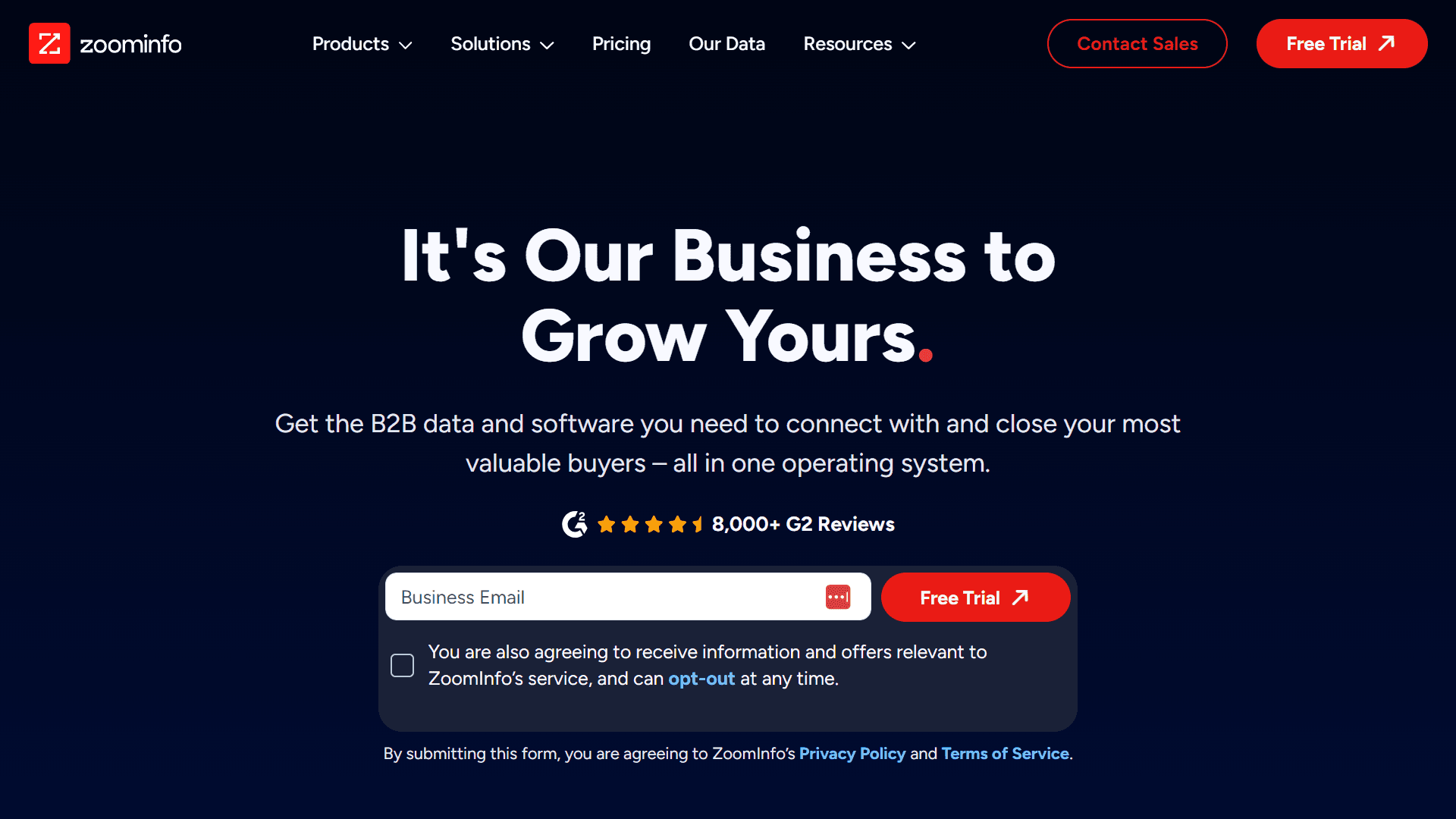
ZoomInfo is a B2B sales intelligence and outreach platform that also provides a layer of engagement tools, such as web chat and web form optimization.
It’s aimed at B2B enterprises and boasts a solid database of B2B data. In addition to the desktop app, users can also take advantage of a Chrome extension for prospecting on the go.
Key features
Customizable enterprise tools. Leverage APIs and data-as-a-service (DaaS) options to customize enterprise solutions.
Lead database. Access a large database of prospects with automated enrichment and segmentation.
Integrations library. Integrate with many third-party platforms like AWS and Snowflake.
Automation. Automate email sequences and parts of the phone outreach process.
Pricing
Pricing isn’t publicly available. Users indicate that pricing is at the enterprise level and expensive compared to other providers.
Pros
Large set of enterprise-level features, including APIs
Interface is easy to configure and use
A large set of integrations with third-party solutions
Cons
Analysis of user reviews indicates that the platform is expensive
Limited AI functionality
There are many complaints about unresponsive customer service
3. HubSpot Sales Hub
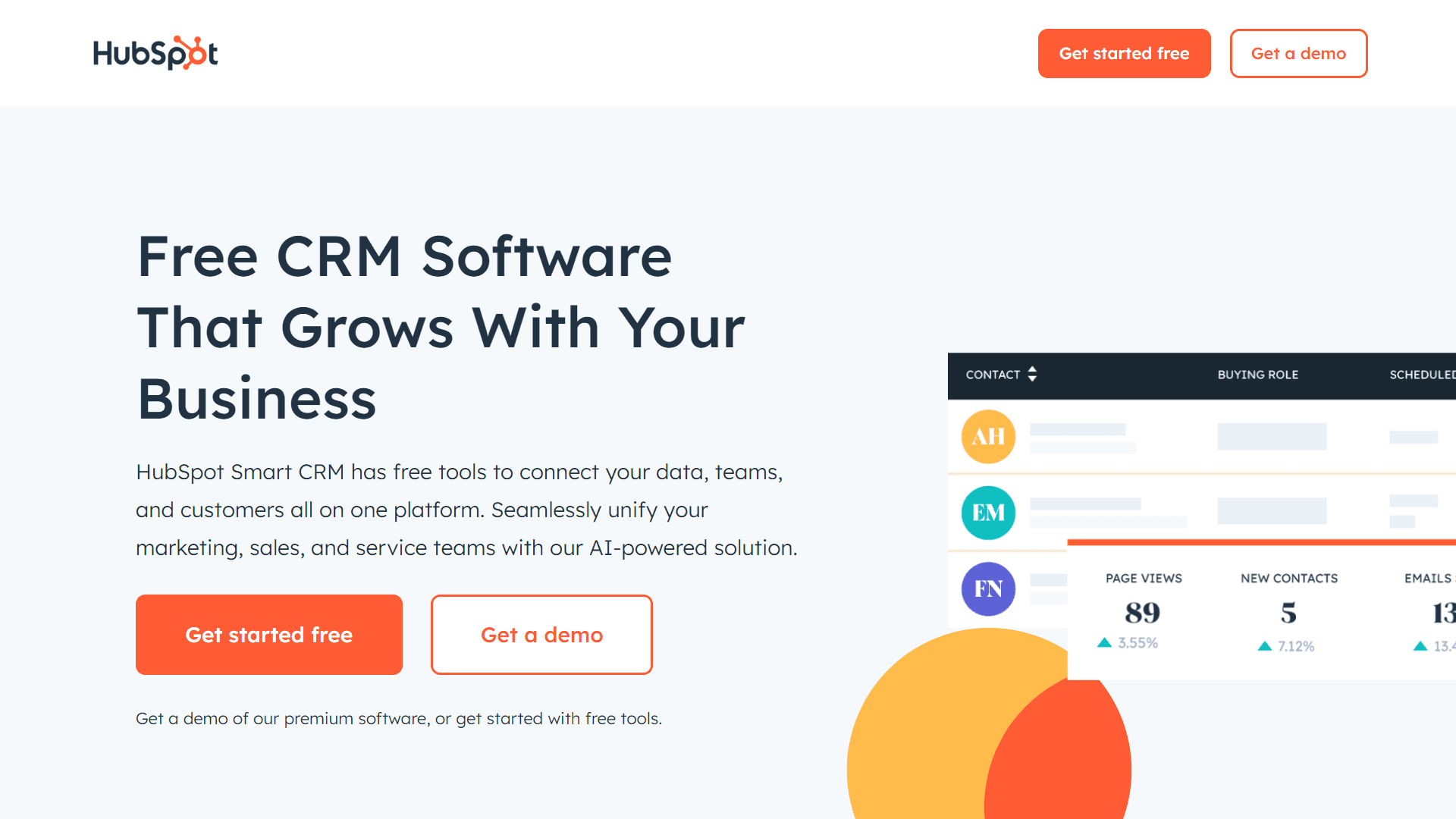
Ah, good ol’ HubSpot. It seems that nowadays, no software review is complete without HubSpot getting at least a passing mention.
Sales Hub is a standalone solution (although it does, of course, integrate with the HubSpot CRM) and has pricing tiers that cater to the whole spectrum of business users, from solopreneurs to multinational enterprises.
Key features
Sales engagement sequences. Build and automate email outreach sequences.
Lead scoring. Score and track the progress of your leads.
CRM integration. Integrate Sales Hub easily with your HubSpot CRM if you use it.
Pricing
Hubspot has three pricing tiers and a free plan. The “Starter” package is $20/month per user, the “Professional” package is $100/month per user, and the “Enterprise” package is $150/month per user.
Pros
Integrates directly with the broader HubSpot CRM
Includes a meeting scheduler and invoicing tools
Easy-to-use platform and large community
Cons
No lead database
AI functionality is limited to writing emails
Per-user pricing can quickly add up
4. LinkedIn Sales Navigator
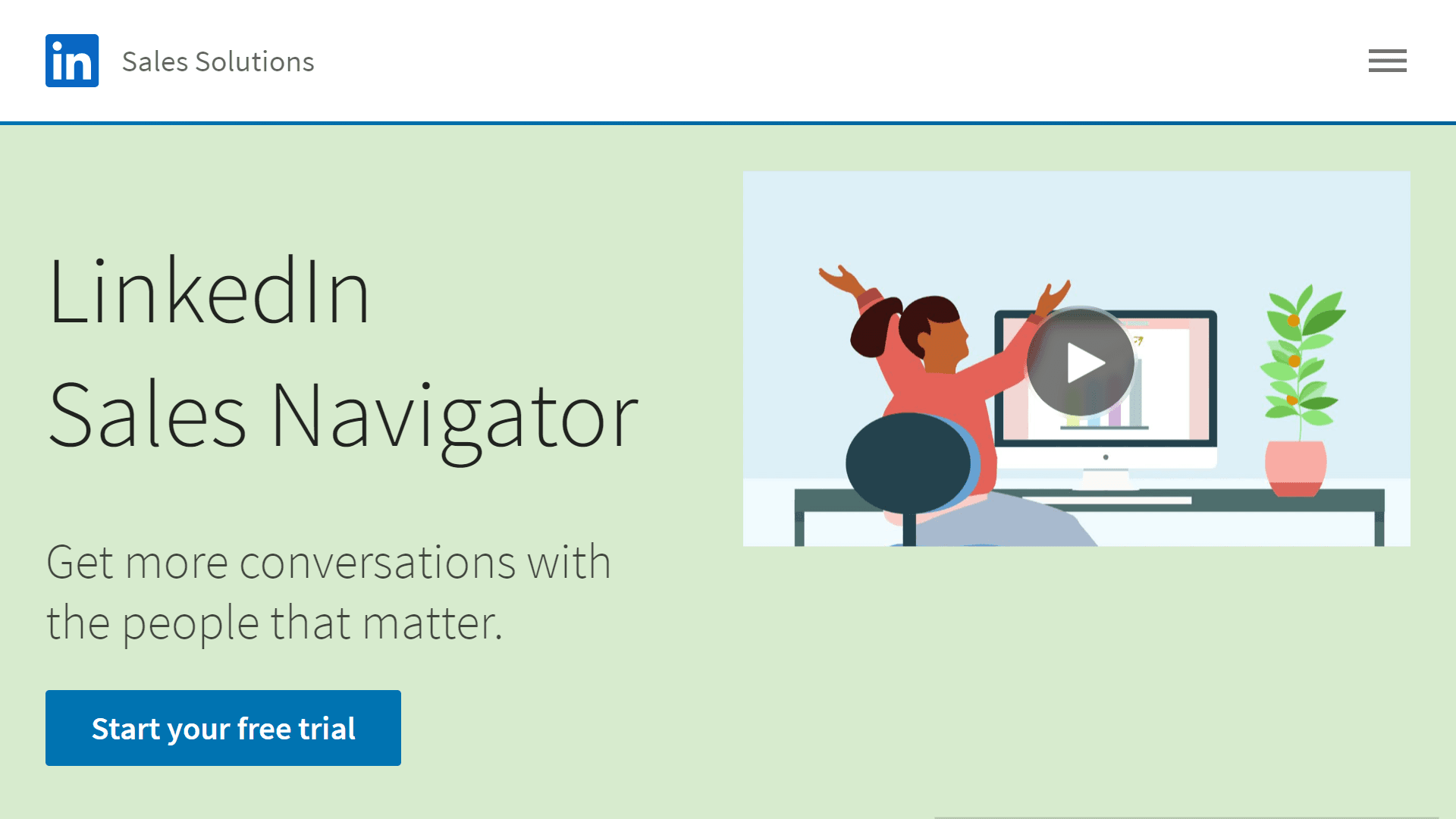
LinkedIn Sales Navigator is one of the most popular sales prospecting tools, largely by virtue of the fact LinkedIn can advertise to virtually every sales professional on the planet.
Automation features are limited, and, perhaps counterintuitively, its database is relatively small compared to other providers because it only provides access to individuals and companies with profiles.
Key features
Lead database. Access a database of around 60 million LinkedIn users.
Intent tracking. Filter leads based on signals like job changes and profile visits.
Integrations library. Integrate with top CRMs like HubSpot and Salesforce.
Pricing
Sales Navigator “Core” costs $99/month, and Sales Navigator “Advanced” costs $169.99/month. A custom plan with additional features is also available.
Pros
Useful for manual LinkedIn outreach of warm prospects
High-quality lead data
Integrates with the main CRMs
Cons
Small database
Limited automation and AI functionality
Most advanced features require a custom plan
5. Lusha
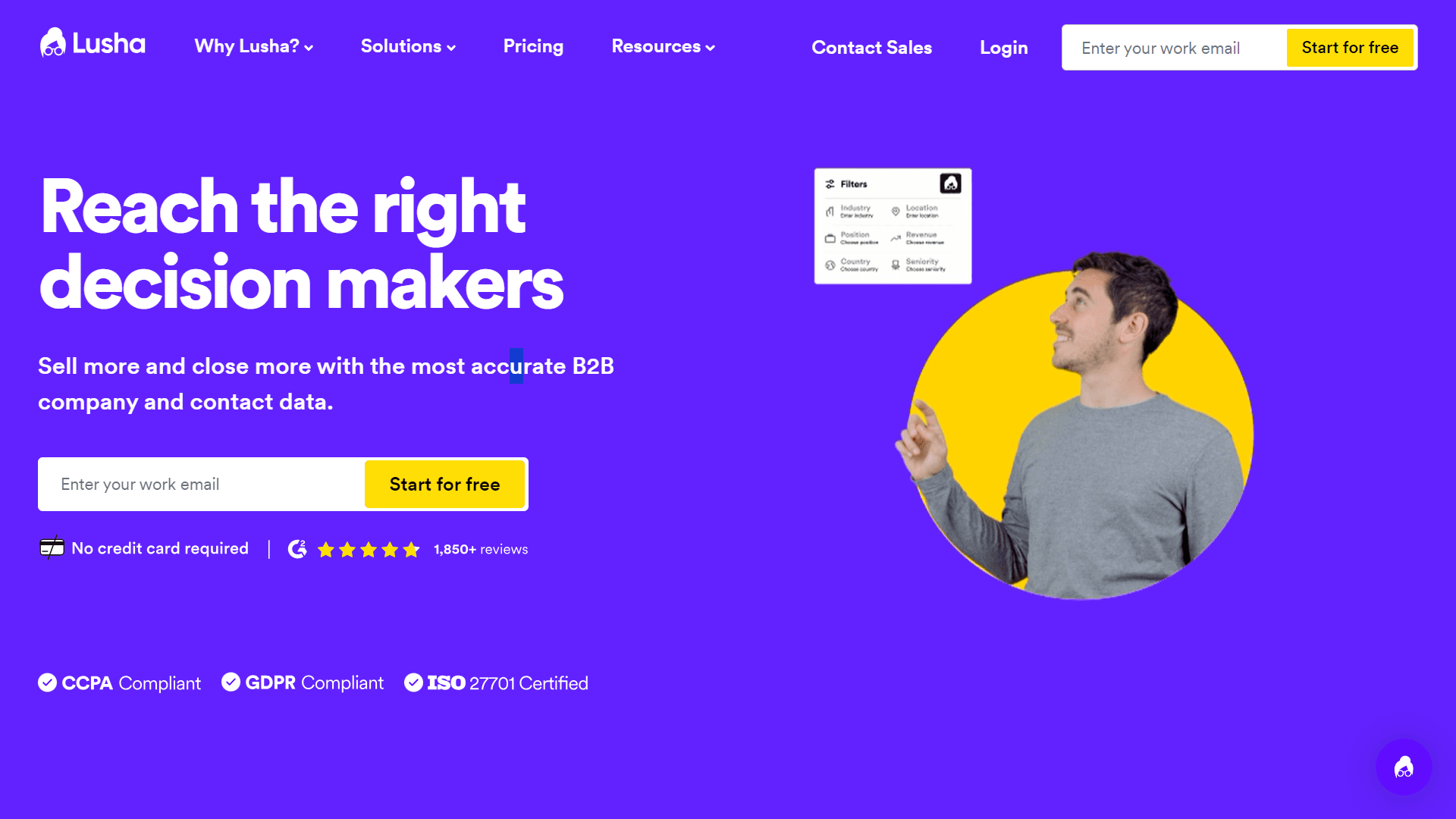
Lusha is a rising star in the sales prospecting space. It’s garnering a reputation as a solid source of email contact data—with rigorous email verification criteria—but has mixed reviews when it comes to phone numbers.
Key features
Lead database: Prospect from a database of 50 million enterprise accounts, with many GDPR-compliant leads.
Intent filter. Track intent and lead readiness with behavioral data.
Workflow automation. Automate email sequences and lead identification.
LinkedIn browser extension. Prospect from LinkedIn while browsing.
Pricing
Lusha has two paid tiers in addition to free and custom plans. The “Pro” plan is $49/month per user, and the “Premium” plan is $79/month per user.
Pros
Transparent pricing for smaller companies
Emphasis on GDPR-compliant data
Simple and intuitive platform
Cons
Phone data requires credits
Few segmentation features
Lack of AI functionality
6. Seamless.AI
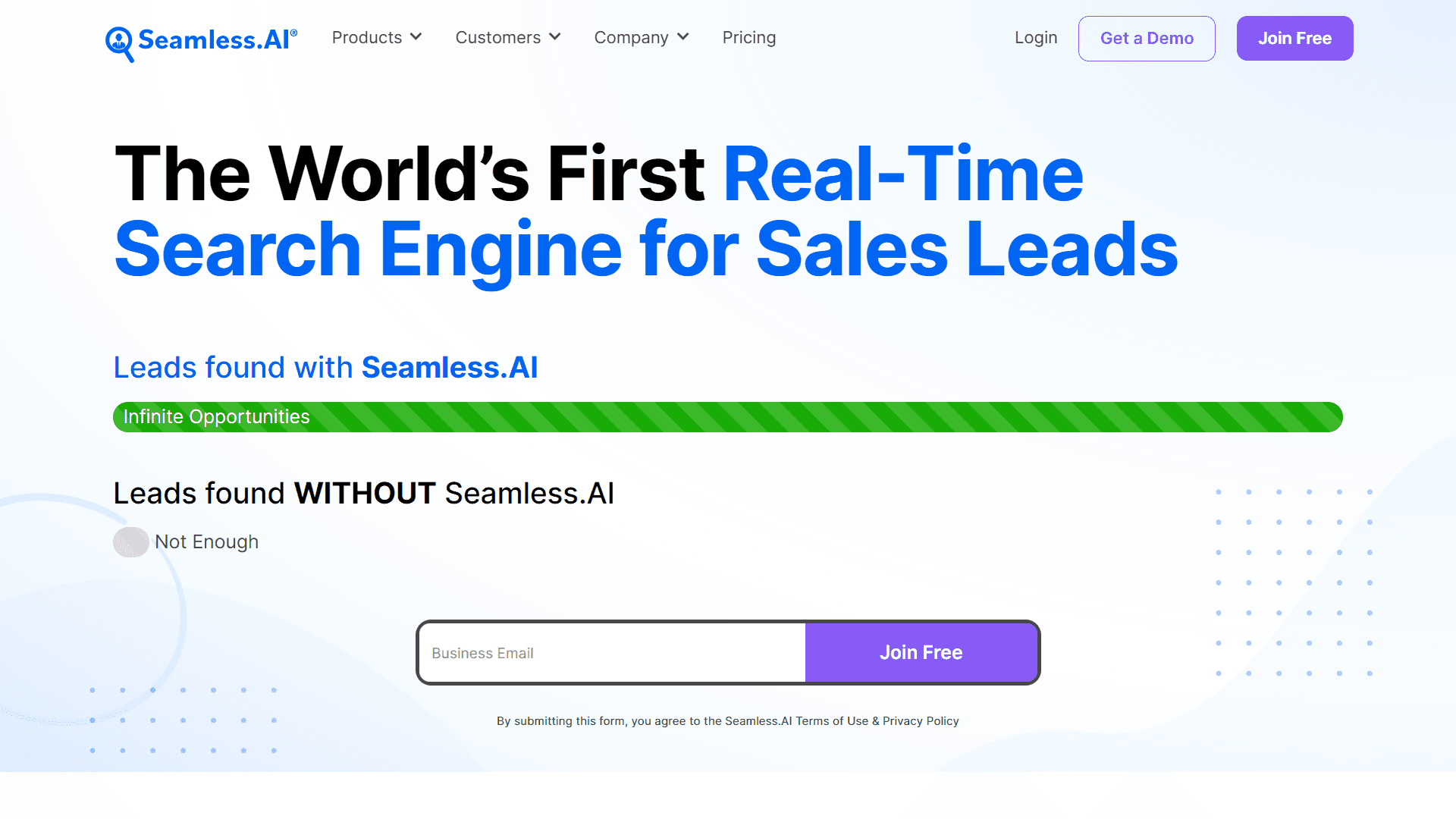
Seamless.AI places AI functionality at the core of its platform, using it to verify and enrich B2B contact data and lead lists and automate cold email outreach.
It works on a lead credit basis, so there will be limits on how much outreach you can conduct if you opt for Seamless.AI.
Key features
AI-enriched lead database. Access a large database of prospects with AI-enriched data.
Workflow automation. Send automated email outreach and follow-up with emails written by AI.
Lead search engine. Search directly for leads using the prospect “real-time search engine.”
Pricing
Seamless.AI offers a free trial with 50 credits. Contact sales to learn about pricing for the “Basic,” “Pro,” and “Enterprise” plans. User reviews indicate that pricing starts at approximately $150/month.
Pros
Strong AI functionality
Automation tools for email sequences
Lead search engine for finding individual sales leads
Cons
Credit-based structure, which can restrict outreach
Limited customer support on “Basic” plan
Many advanced features like intent signals are only available on the “Pro” plan and above
7. Hunter
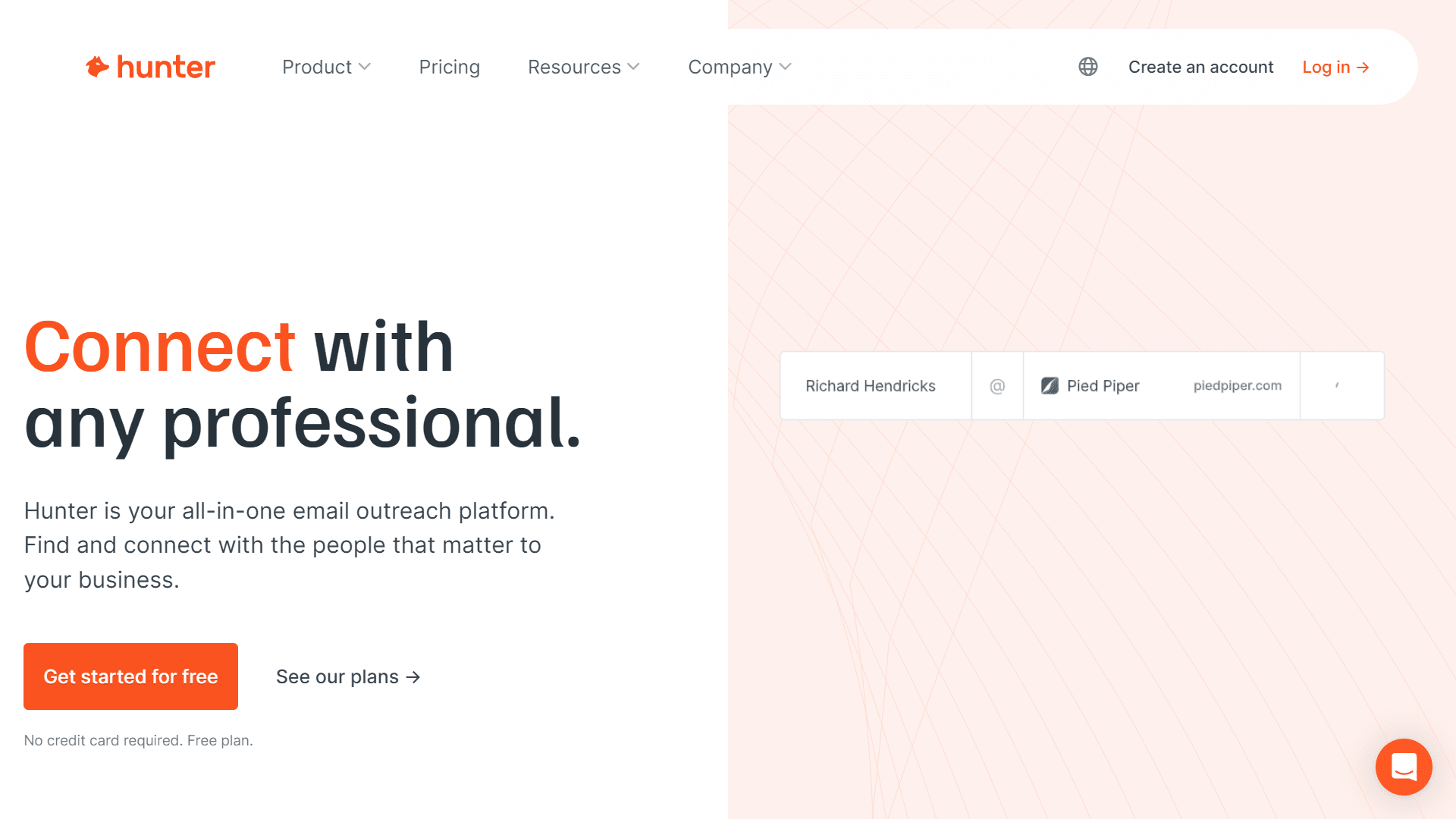
Email is Hunter’s thing. It’s a good Apollo’s alternative but focused on near-exclusively email, with little additional lead data.
While Hunter does have discovery and prospecting features, it’s better understood as an email finder rather than a sales outreach one. It’s a potential option for smaller businesses without complex prospecting requirements.
Key features
Email search tool. Search for email addresses at target companies and run email verification.
Campaign automation. Run semi-automated email campaigns on the platform.
Integrations. Integrate with the most popular CRMs and use the browser extension to enhance prospecting.
Pricing
Hunter has a free plan with 25/searches per month. The “Starter” plan is $49.00/month, the “Growth” plan is $149/month, and the “Business” plan is $499/month. Hunter also has an enterprise tier.
Pros
Good email data accuracy
Unlimited users (limits are based on monthly searches)
Browser add-on
Cons
No phone data
Restrictions on the number of email searches per month
Limited automation and AI features
8. RocketReach
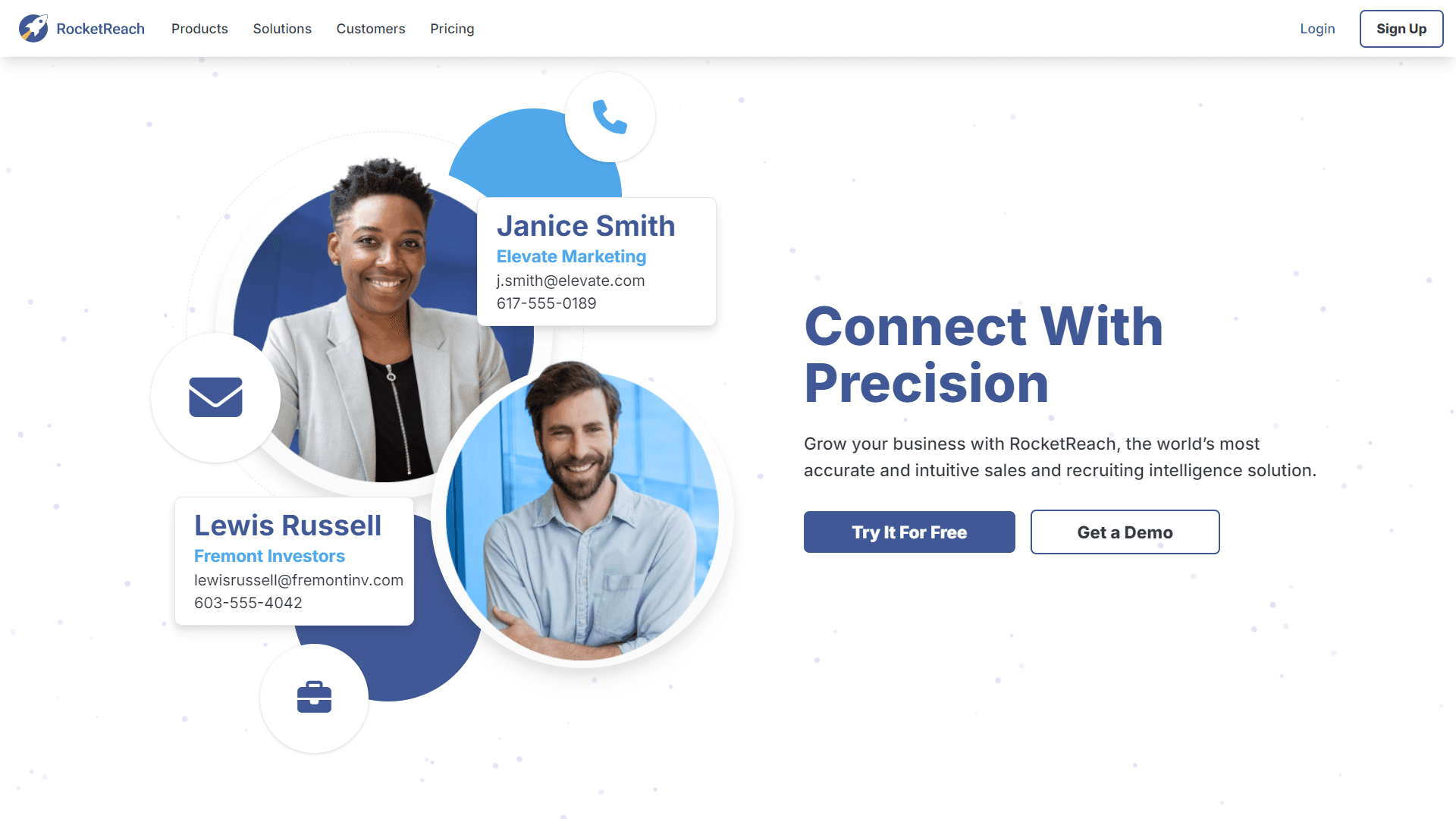
RocketReach has a colossal database of 700 million leads and a strong set of lead-generation automation features.
That said, users have raised concerns about the quality of B2B email and direct dials. In addition, to access unlimited data, you need to subscribe to an annual plan.
Key features
Leads database. Access a huge database of 700 million leads.
Intent signals. Tailor outreach to target individuals with strong buyer intent.
API. Rocket offers an API for enterprise use.
Pricing
RocketReach offers a range of pricing tiers from $39.00/month (individual plan) to $349/month per user (team plan). You’ll need to purchase an annual plan for unlimited lead data.
Pros
Large lead database
Well-priced individual plans
Email automation
Cons
The database is of questionable quality based on user reviews
Forces you to purchase the annual plan to unlock features
A limited number of integrations
9. Lead411
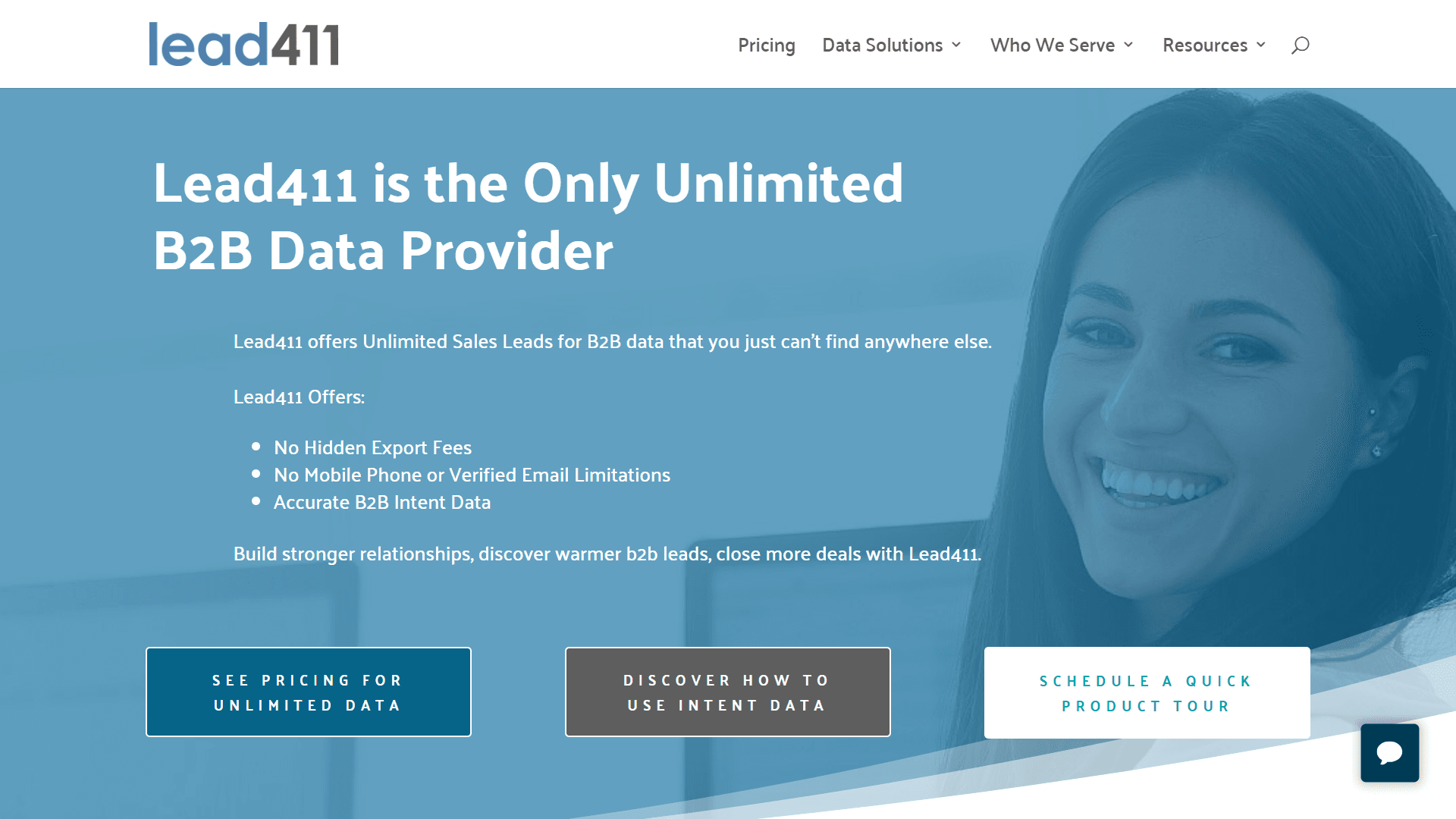
Lead411 bills itself as the only unlimited B2B data prospecting tool. That’s not quite true—other services don’t cap the amount of lead data you can access—but it does have a pretty sizable database of over 450 million.
Lead411 has added outreach tools for running email campaigns directly to the platform and also offers intent data on its premium plans.
Key features
Unlimited data access. Gather as much lead data (emails and phone numbers) as you want without any limits.
Intent signals. Track intent signals and score B2B leads (only available on the higher-tier plan).
Outreach management. Run email campaigns on the platform, including SMS outreach.
Pricing
Lead411’s “Basic Plus Unlimited” plan costs $99/month per user. Intent data is available on the annual “Pro” and “Unlimited” packages. Contact sales for pricing. A free trial is available.
Pros
Large database with unlimited access
Integrations with top CRMs
Chrome extension for prospecting while browsing
Cons
Expensive compared to other Apollo alternatives
Small number of integrations compared to other tools
Intent data is not available on all plans
10. Pipedrive
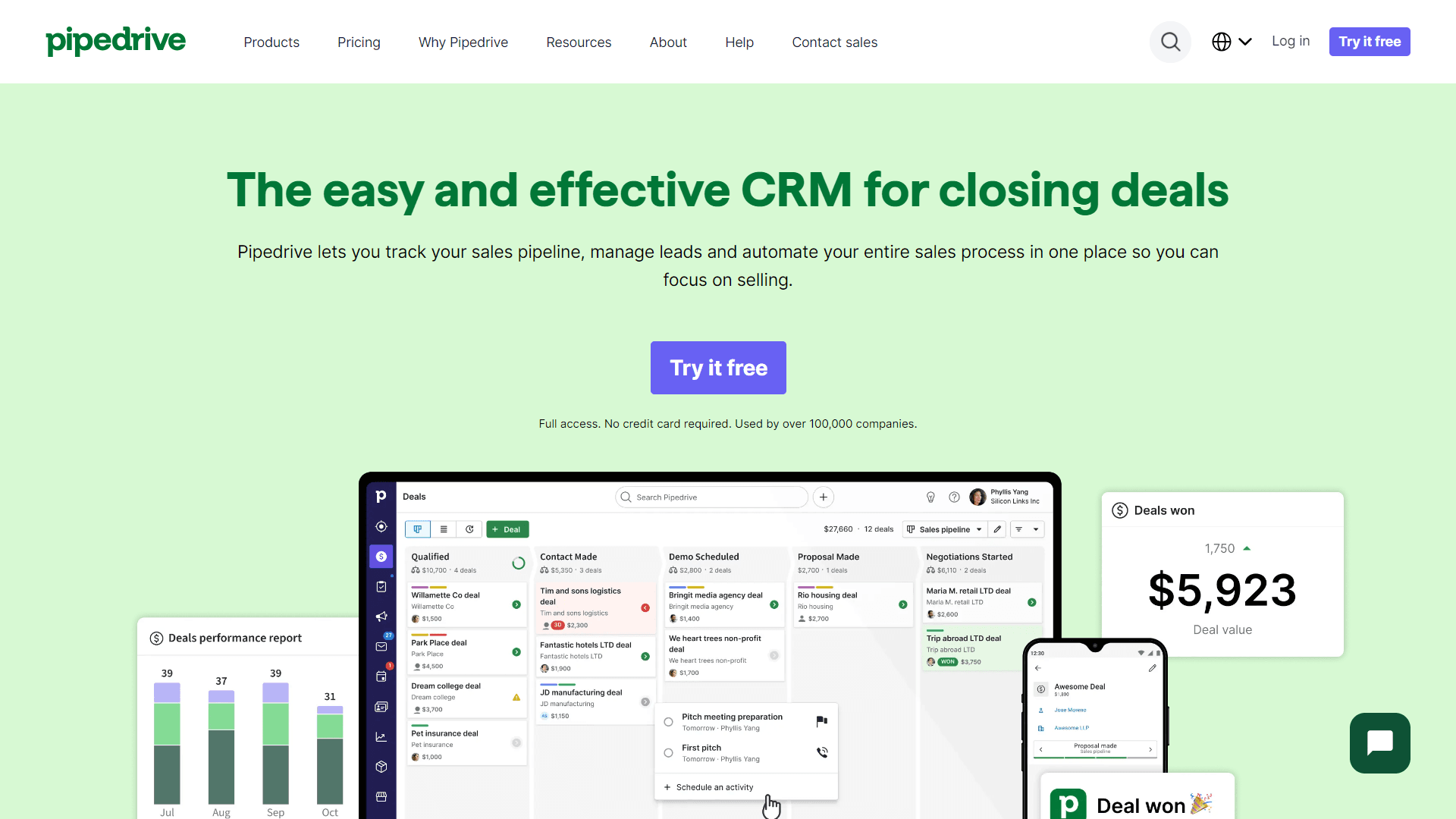
Pipedrive is a tool for running email campaigns and outreach workflows rather than for prospecting.
It’s an excellent enterprise-level sales enablement platform. But if you’re looking for fresh leads, you’ll need an additional service that provides access to a database.
Key features
Outreach management. Manage leads and run segmented email campaigns.
Analytics. Access granular data about your campaigns across a range of metrics like revenue targets and sales team performance.
Large library of integrations. Integrate Pipedrive with your whole tech stack.
Pricing
Pipedrive offers several pricing plans, beginning at $14/month per user and ending at $99/month per user. All plans have free trials.
Pros
Powerful enterprise-level sales enablement platform
Growing AI functionality
Lots of integrations
Cons
It doesn’t provide access to a lead database
Slightly convoluted pricing structure
Intuitive and well-designed interface
It’s time to say goodbye…
We get it. Wading through sales enablement platforms is hard work. Learning to navigate different dashboards is time-consuming and frustrating. But it is worth it.
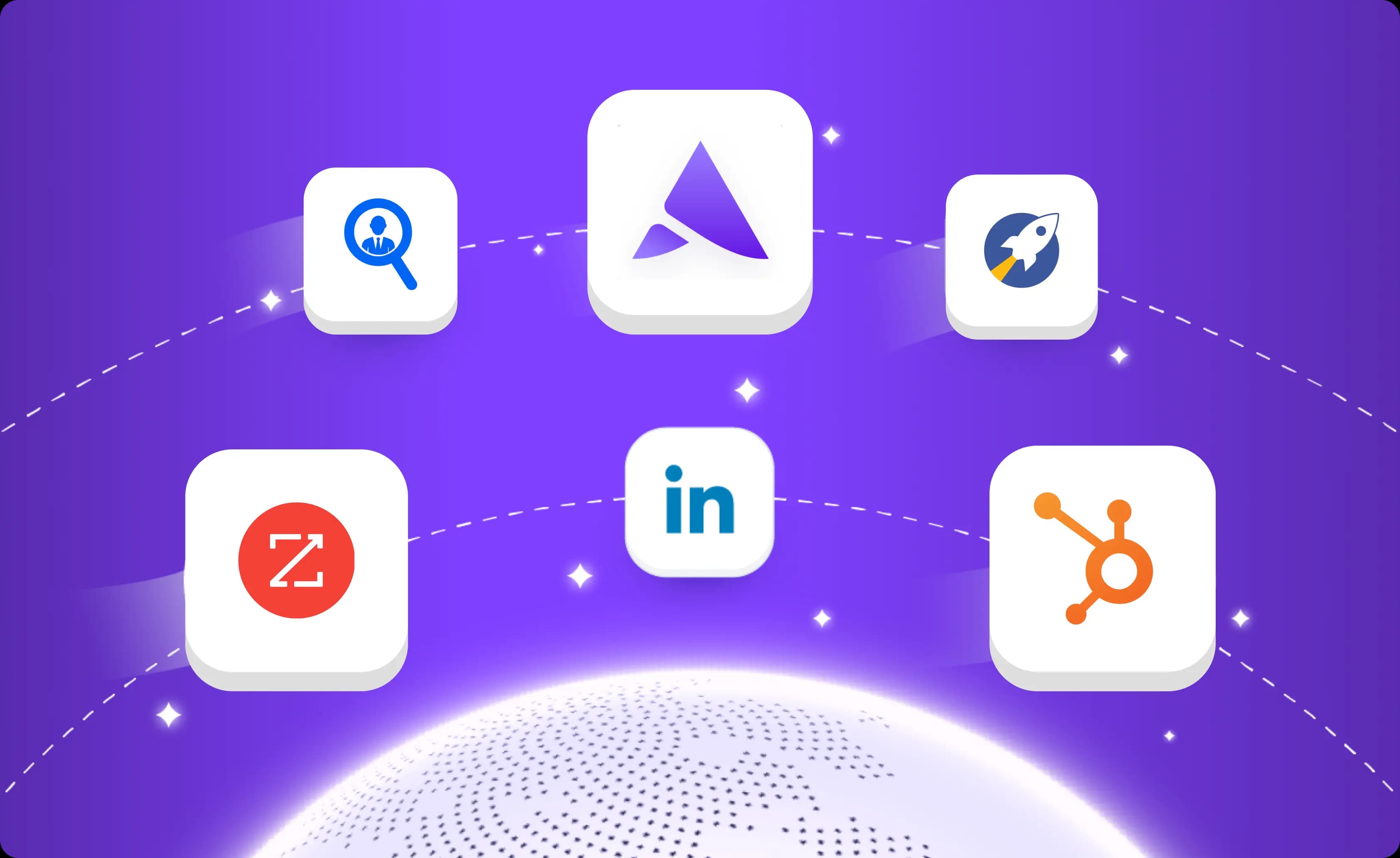
The hours you devote to picking the right tool—one that’s ideally suited to your and your team’s specific needs—is time well spent. Leads are the lifeblood of your business. And the tools you use will make a big difference.
As for parting advice, we recommend taking full advantage of free trials and demos. Oh, and don’t forget to give Artisan a test drive. We know you’ll love it.
Frequently Asked Questions (FAQs)
What is Apollo.io?
Apollo is a lead prospecting and outreach platform. Its user base has grown substantially over the last several years and is now a market leader. Its top features include an extensive lead database and outreach automation tools.
Why consider alternatives to Apollo.io?
Alternatives to Apollo may offer features better suited to your needs. Apollo’s competitors sometimes perform better in terms of database size, AI functionality, ease of use, and pricing, to name some examples.
Which tool is best for small businesses?
Hunter, RocketReach, and Lusha all have pricing tiers that will appeal to small businesses. HubSpot Sales Hub is also a good option but doesn’t provide lead data.
How to evaluate sales automation tools?
To evaluate sales automation tools, take full advantage of free trials, check the quality of the lead database by conducting your own searches, check user reviews, and don’t hesitate to contact support with questions.
Author:
Jaspar Carmichael-Jack
You might also like

Ready to Hire Ava and Supercharge Your Team?
Ava is equipped with the best-in-class outbound tools to automate your outbound, freeing your reps’ time to focus on closing deals.